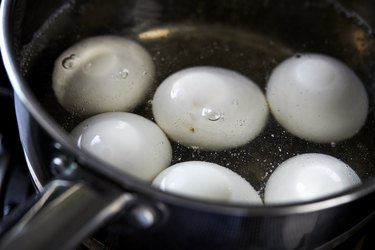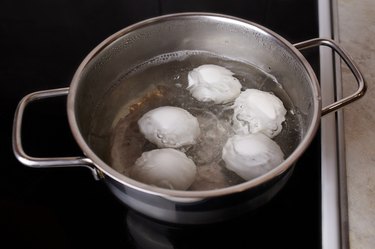
An egg that floats in boiling water can be an indication that it's not fresh. However, there are a few other possible explanations for what it means when eggs are floating when boiling in hot water. There's actually a scientific explanation for why eggs sink in fresh water but float in salted water.
Egg Buoyancy and Density
Video of the Day
An object will sink if it is denser than a buoyant force — in this case, the water — and an object will float if its weight is less than the buoyant force. Because fresh water is less dense than salt water, the egg sinks in fresh water. Because salty water is more dense than the egg, it floats in salt water.
Video of the Day
Do Eggs Float in Water?
Salty water aside, there is a second reason that may cause an egg to float in boiling water. An egg can float in water when its air cell is sufficiently large enough to keep the egg buoyant. Soon after an egg is laid, it naturally cools, creating a small air space as its contents contract. The air cell is found at the larger end of the egg between the inner and outer membranes.
Eggs develop larger air cells as they age, but they are often still perfectly good to eat.
Do Rotten Eggs Float in Water?
As an egg ages, this air cell grows larger as the yolk and white further contract. Therefore, an older egg is less dense and you're more likely to see floating eggs when boiling them.
Store-bought eggs can last several weeks beyond their sell-by date or expiration date. To reduce the chances of eggs going bad, keep them refrigerated.
If you see floating eggs when boiling them, your eggs are likely old, but the test doesn't necessarily mean they're bad to eat.
Do Cracked Eggs Float?
If the egg's shell is cracked, egg white will leak out into the boiling water. This reduces the mass of the egg, making it easier for the egg to float. Some bits of boiled egg white will float around in the saucepan of boiling water, which is unattractive but harmless.
How to Boil Eggs

Take care not to crack the eggshells when lowering eggs into boiling water. It's best to use a slotted spoon to gently lower the eggs into the saucepan.
Alternatively, start with the eggs covered by an inch of cold water and bring the water to a boil. There's no need to add salt to the water or to cover the saucepan.
Hard-boiled eggs require 10 to 12 minutes in boiling water, depending on how you like them.
Once they've been in the boiling water for your desired time, stop cooking immediately by placing the eggs in a bowl of ice water. They'll begin to cool down so that you can peel and enjoy them in minutes.
Floating Eggs Experiment
The only items needed for this simple egg test are an egg, a tall glass, water, table salt, and a tablespoon.
- Fill a glass halfway with water.
- Place an egg in the glass of water. The egg will sink to the bottom of the glass.
- Add a tablespoon of salt to the water and stir.
- Continue adding and stirring salt into the water, 1 tablespoon at a time, until the egg floats to the top. Three tablespoons of salt should be enough to make the average-sized chicken egg float.
The experiment can also be conducted with two eggs and two separate glasses, one for the unsalted water, a kind of control, and the other for the salted water.
Tip
Because there's no boiling water involved in this experiment, it's a great (and safe) visual for kids to learn about density.
The Sniff Test: The Best Way to Tell if Eggs Are Bad
If you're not sure if your eggs have gone bad, test the quality of an egg before consuming it. Rotten eggs have a very distinct, offensive odor — you'll know if your egg smells rotten. Just give a quick sniff when cracking an egg open to ensure its freshness, as rotten eggs can cause food poisoning. Any question about whether an egg is safe for eating will be readily resolved.